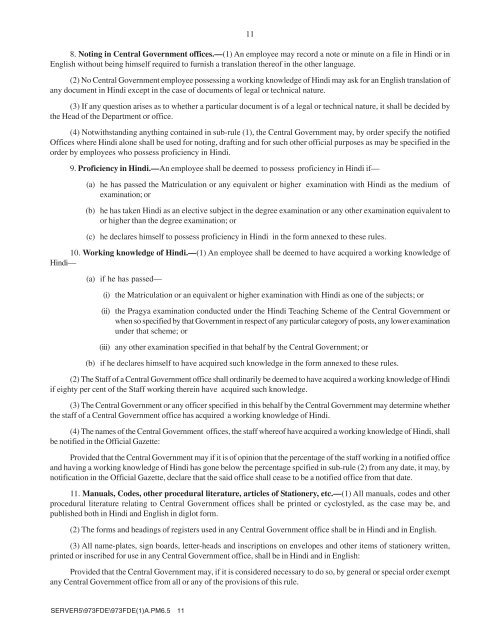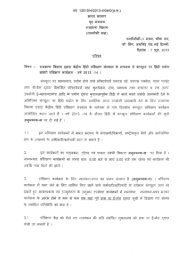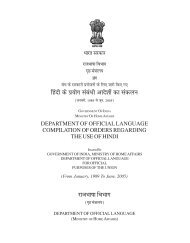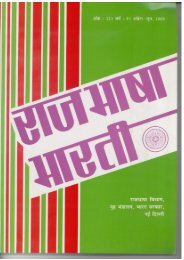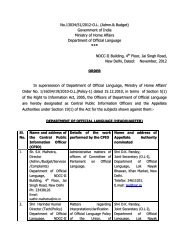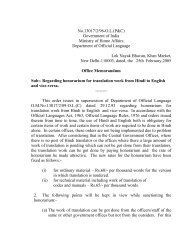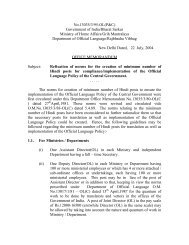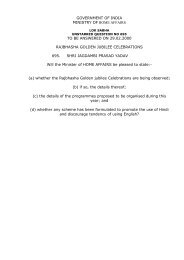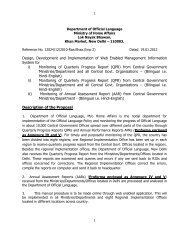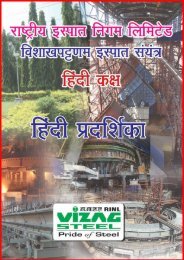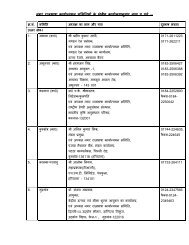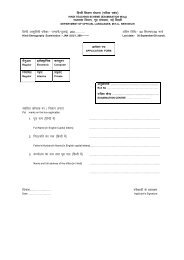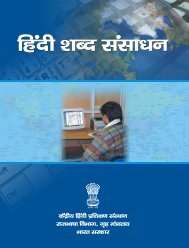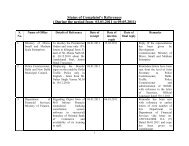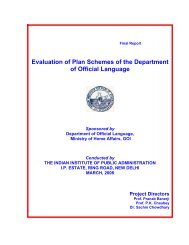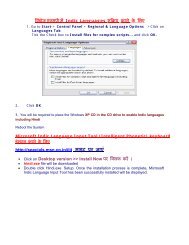fganh ds iz;ksx laca/kh vkns'kksa dk ladyu jktHkk"kk foHkkx
fganh ds iz;ksx laca/kh vkns'kksa dk ladyu jktHkk"kk foHkkx
fganh ds iz;ksx laca/kh vkns'kksa dk ladyu jktHkk"kk foHkkx
Create successful ePaper yourself
Turn your PDF publications into a flip-book with our unique Google optimized e-Paper software.
SERVER5\973FDE\973FDE(1)A.PM6.5 11<br />
11<br />
8. Noting in Central Government offices.—(1) An employee may record a note or minute on a file in Hindi or in<br />
English without being himself required to furnish a translation thereof in the other language.<br />
(2) No Central Government employee possessing a working knowledge of Hindi may ask for an English translation of<br />
any document in Hindi except in the case of documents of legal or technical nature.<br />
(3) If any question arises as to whether a particular document is of a legal or technical nature, it shall be decided by<br />
the Head of the Department or office.<br />
(4) Notwithstanding anything contained in sub-rule (1), the Central Government may, by order specify the notified<br />
Offices where Hindi alone shall be used for noting, drafting and for such other official purposes as may be specified in the<br />
order by employees who possess proficiency in Hindi.<br />
9. Proficiency in Hindi.—An employee shall be deemed to possess proficiency in Hindi if—<br />
(a) he has passed the Matriculation or any equivalent or higher examination with Hindi as the medium of<br />
examination; or<br />
(b) he has taken Hindi as an elective subject in the degree examination or any other examination equivalent to<br />
or higher than the degree examination; or<br />
(c) he declares himself to possess proficiency in Hindi in the form annexed to these rules.<br />
10. Working knowledge of Hindi.—(1) An employee shall be deemed to have acquired a working knowledge of<br />
Hindi—<br />
(a) if he has passed—<br />
(i) the Matriculation or an equivalent or higher examination with Hindi as one of the subjects; or<br />
(ii) the Pragya examination conducted under the Hindi Teaching Scheme of the Central Government or<br />
when so specified by that Government in respect of any particular category of posts, any lower examination<br />
under that scheme; or<br />
(iii) any other examination specified in that behalf by the Central Government; or<br />
(b) if he declares himself to have acquired such knowledge in the form annexed to these rules.<br />
(2) The Staff of a Central Government office shall ordinarily be deemed to have acquired a working knowledge of Hindi<br />
if eighty per cent of the Staff working therein have acquired such knowledge.<br />
(3) The Central Government or any officer specified in this behalf by the Central Government may determine whether<br />
the staff of a Central Government office has acquired a working knowledge of Hindi.<br />
(4) The names of the Central Government offices, the staff whereof have acquired a working knowledge of Hindi, shall<br />
be notified in the Official Gazette:<br />
Provided that the Central Government may if it is of opinion that the percentage of the staff working in a notified office<br />
and having a working knowledge of Hindi has gone below the percentage spcified in sub-rule (2) from any date, it may, by<br />
notification in the Official Gazette, declare that the said office shall cease to be a notified office from that date.<br />
11. Manuals, Codes, other procedural literature, articles of Stationery, etc.—(1) All manuals, codes and other<br />
procedural literature relating to Central Government offices shall be printed or cyclostyled, as the case may be, and<br />
published both in Hindi and English in diglot form.<br />
(2) The forms and headings of registers used in any Central Government office shall be in Hindi and in English.<br />
(3) All name-plates, sign boar<strong>ds</strong>, letter-hea<strong>ds</strong> and inscriptions on envelopes and other items of stationery written,<br />
printed or inscribed for use in any Central Government office, shall be in Hindi and in English:<br />
Provided that the Central Government may, if it is considered necessary to do so, by general or special order exempt<br />
any Central Government office from all or any of the provisions of this rule.


